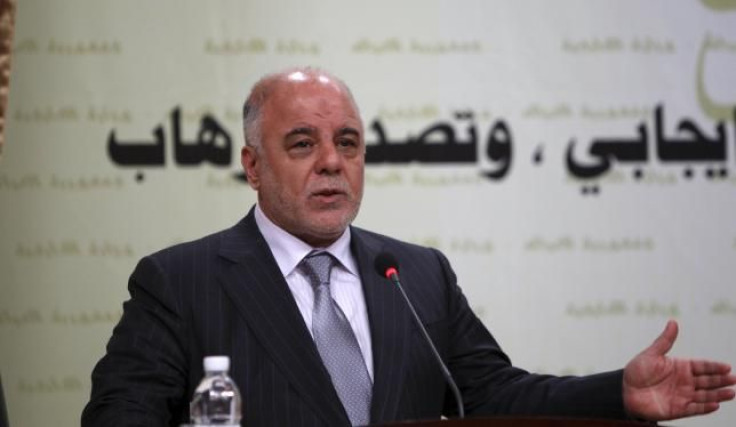Iraq's Leader To Seek Arms, With Deferred Payment, On US Visit

(Reuters) - Iraq's prime minister will seek President Barack Obama's help to acquire billions of dollars in drones and other U.S. arms to fight Islamic State during a U.S. visit next week, but will request deferment of payments for the purchases, a senior Iraqi official said.
Prime Minister Haidar al-Abadi is grappling with an insurgency by militants from Islamic State, an al Qaeda offshoot that emerged from the chaos in Iraq and neighboring Syria and seized much of northern and central Iraq last year.
He is also facing a cash crunch thanks to a plunge in oil prices that is ravaging Iraq's state finances. The government is projecting a budget deficit of roughly $21 billion this year.
Visiting Washington for the first time as prime minister, Abadi hopes to convince a war-weary United States that Iraq deserves more U.S. manpower and arms three years after U.S. troops withdrew from the country in December 2011, as his fledgling army confronts Islamic State, also known as ISIS.
"ISIS is everybody’s problem now," said the senior Iraqi official who spoke on condition of anonymity. "You can’t run away from the problem if it comes to Canada or goes to France," he said in reference to attacks by people influenced by Islamic State or al Qaeda in those countries.
The senior Iraqi official hinted Baghdad could turn to Tehran if it did not get the aid it wants from Washington.
"If that’s not available, we’ve already done it with the Iranians and others," he said, saying that was not the first choice. "The PM is committed to the U.S. ... What he also wants to make sure is that he has a partner that he can rely on."
Obama in August authorized the first U.S. air strikes on Iraq since the U.S. withdrawal and has deployed about 3,000 American military forces to help Iraq to battle the group. But Obama has also imposed limits on the U.S. military role on the ground to training and advising Iraqi and Kurdish forces.
The official said Abadi had a wish list of advanced weapons, including unarmed drone aircraft, Apache attack helicopters manufactured by Boeing Co, ammunition and more for his meeting with Obama on Tuesday. He will also seek permission to postpone payment for the weaponry.
"We’re talking about billions here," he said. "This is a new approach for us because of the scale of the challenge we have ahead. Mosul and Nineveh province and Anbar will cost us a lot."
The White House had no immediate comment on Abadi's planned requests or whether it might grant them.
Aware of time it takes to train pilots, one possibility that could also be explored during Abadi's visit would be the United States loaning Iraq Apaches, along with the pilots to fly them. Likely payment terms on those and the other arrangements for U.S. arms were unclear.
The Iraqi government on April 2 claimed victory over Islamic State insurgents in Tikrit after a month-long battle for the city supported by Shi'ite militiamen and U.S.-led air strikes, an achievement marred by complaints of militia looting and burning of homes in the Sunni city.
Seeking to gain momentum, Iraqi security forces on Wednesday launched a new offensive against Islamic State in the Sunni Muslim heartland of Anbar. They are eventually expected to move on to Nineveh and its capital Mosul, the group's stronghold.
But Iraq is still burdened by a legacy of sectarianism. Its minority Sunni population resented former Prime Minister Nuri al-Maliki's Shi'ite majority government and were incensed by his ordering troops to clear a Ramadi protest camp in December 2013.
U.S. officials believe they have a better partner in Abadi but are still wary of the volatile politics in a fractured country that is seeing Iran strengthening its role.
(For an interactive graphic, please click: here)
(Editing by Jason Szep and Grant McCool)
© Copyright Thomson Reuters 2024. All rights reserved.











